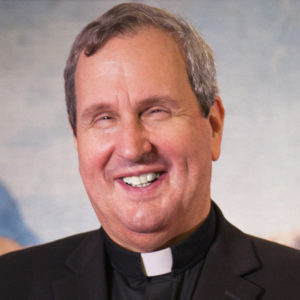God the Father is much more than a human father, but sometimes he seems to be less. What human father would ask his own son to sacrifice himself to fulfill the father’s will? Would it not be the other way around?
Well, here’s the deal. What Jesus’ mission on earth is, is sacrificing himself.
And he’s sacrificing himself as an actuality of unconditional love. The idea of Jesus fulfilling the Father’s will, it’s not that the Father’s up there going and saying to the Son, “You gotta go down to Earth now become incarnate. And now the next thing I want you to die.”
What’s going on here is that the Father is, at it were, permitting the Son, the second person of the Trinity, to come, to incarnate himself. And to give himself in complete self-sacrifice.
Jesus’ Mission on Earth: The Definition of Love
What we’re dealing with here, when we’re dealing with self sacrifice, is Jesus’s definition of love. There is no greater love than a man can have than to give his whole self, give his life for his friends.
He is giving himself, right? He is literally sacrificing himself intentionally to bring an unrestricted act of love into the world.
Why would he want to bring an unrestricted act of love into the world? Because bringing that love into the world, making it real within the world, with its infinite capacity to extend love, mercy, compassion, forgiveness, and healing to everyone who believes in it and comes into it, is Jesus’s whole reason for being here.
Now, I’m not just going to talk about love. I’m talking about bringing love, real love, through a real concrete, historical action. And the highest form of love is self-sacrifice, to give one’s whole self away for the good of the other.
That’s going to be the redemptive act that’s going to redeem us all as believers in Jesus.
Now that’s his intention. And because it is his intention, know then that we are safe.
Jesus’ Mission on Earth: The Father’s Intention
Does the Father have a similar intention? Yes. He’s not demanding this of the Son. The Son asks the Father in the Garden of Gethsemane, “Let this cup pass from me, unless it’s your will.” In other words, Jesus is telling the Father, “I want to do what’s going to redeem the world.”
He knows what the Father’s will is.
The Father’s will is to optimize love, optimize salvation, and optimize good in our lives. The Father’s is will never the opposite. The Father never wills anything arbitrarily. The Father’s will is undifferientiatable from unconditional and perfect love.
So when Jesus says, “But if not, then thy will be done,” what he’s saying is, “Thy unconditionally and unrestrictedly perfect loving will be done.”
And of course he wants to be in conformity with that unconditionally and perfect loving will because that is what’s going to redeem the world.
And if that’s wants necessary to redeem the world, so that darkness, the devil, no human sin can ever again overcome and become dominant in the world, then Jesus says, “Then thy will, they unconditionally loving will be done.”
So you’ve got to get that image out of your mind. It’s a great question, but you’ve go to get that image out of your mind that the Father’s up there going to the Son, “Okay go down and die. That’s what I will for you.”
It’s not that at all.
It’s really a dialogue between the Father and the Son as to how bring the unconditional love into the world that will save the world forever.
Like us on Facebook
Follow us on Twitter
Share this article, via:
To Receive Future Spitzer Center Content And Program Information
Visit us on Facebook and please take a minute to like us and to write a review of your experiences with the Spitzer Center!!
Please call or email to learn more:
734.677.7770
info@spitzercenter.org



